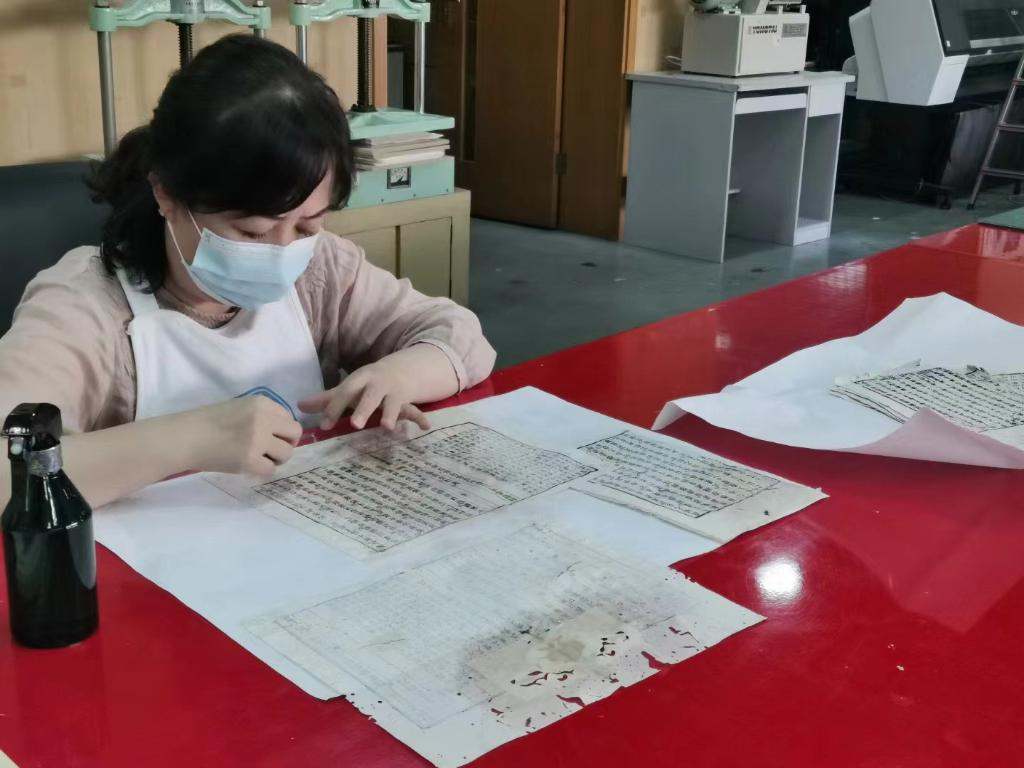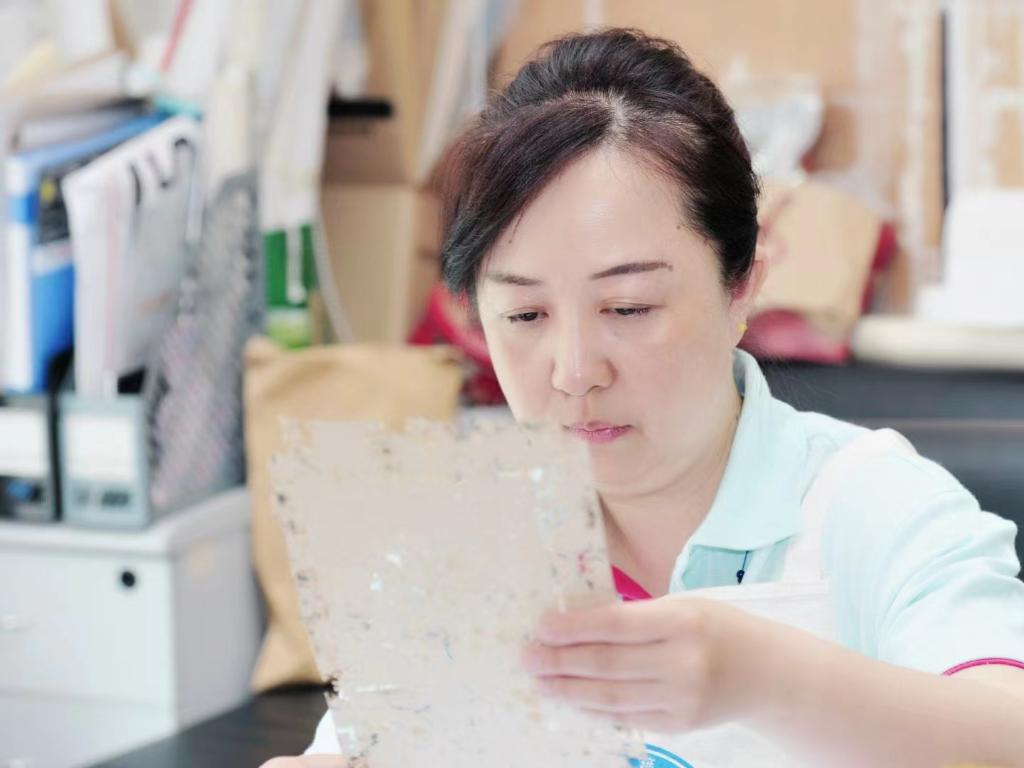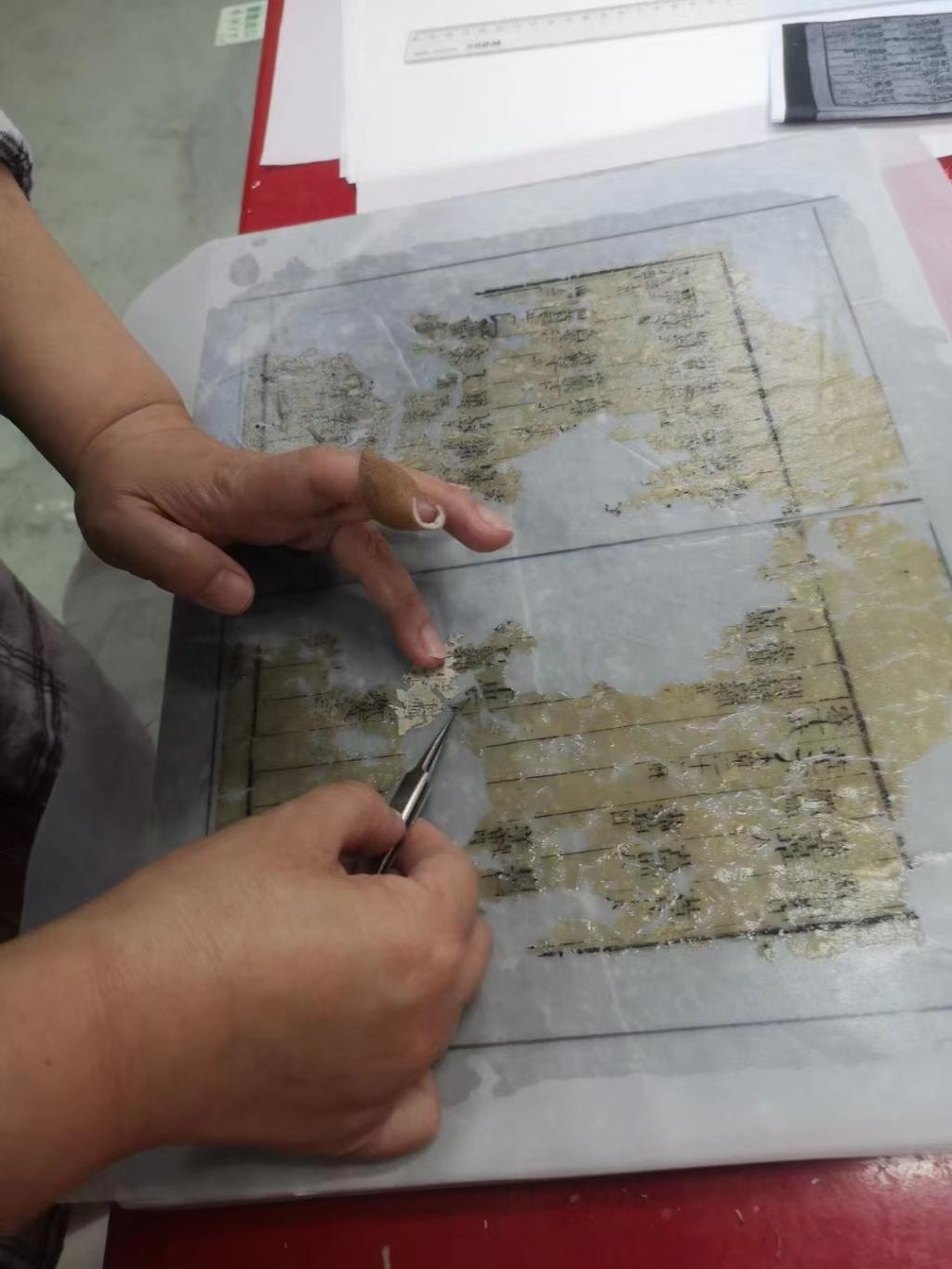Ancient book restorers make paper treasures survive another one to two hundred years
2024-04-26 14:45:53
CHONGQING (CQNEWS) -- Ancient books, a significant carrier of our precious cultural heritage, have got worn over time. Xu Tong, one of the ancient book restorers, can heal these dying books and make them survive another one to two hundred years.
Xu Tong makes paper treasures survive another two hundred years
Stepping into the Ancient Book Restoration Center of Chongqing Library, we saw Xu Tong sitting next to a long table with a range of tools for repairing ancient books on it. She was fully immersed in the duty of handling and healing the old books. In that instance, it was as if time stood still.
Ancient books, showing the signs of age, are a testimony to the existence of culture.
The books published before 1912 are called ancient books. Ancient books are getting old as human beings do, and they may get damaged due to improper preservation. That’s why we need ancient book restorers to heal these books.

Working in the Ancient Books Restoration Division of Chongqing Library, Xu Tong has restored hundreds of ancient books. As the day goes on, Xu Tong starts to worry that there are too few book restorers for a great many ancient books that need to be repaired. In Chongqing Library, there are 11 ancient book restorers, while the ancient books amounted to 430,000. The restoration of these books will require more than a lifetime, Xu thinks.
Book restoration is an arduous task that covers more than 20 procedures and demands infinite patience and meticulousness. A badly damaged ancient book requires even more tedious work. It took Xu Tong six months to repair one of the Mi’s Ancestral Hall Posts, a book of rubbings in the Qing Dynasty.
Xu Tong has never been discouraged by the overwhelming challenges of book restoration, as she believes that trying her best to extend the life span of ancient books is better than doing nothing.

Book restoration allows restorers to communicate with predecessors.
Book restoration allows Xu Tong and other restorers to touch the history and culture from hundreds of years ago.
Ancient book restoration traces its history back to before the Tang dynasty. With the development of technology, ancient book restoration techniques are divided into two styles: Northern Style prevailing in Beijing, Tianjin, and Shandong; and Southern Style flourishing in Shanghai, Suzhou, Yangzhou, and Sichuan. The book restoration technique of Chongqing is a sub-division of Southern Style.
Restorers should, ideally, use similar restoration materials and methods as the original, said Xu. Ancient books are too old and worn out to leave room for innovation, and Xu Tong dares not use some new material that had not been researched. Therefore, she adheres to the Southern-style ancient book restoration techniques and insists on using traditional handmade paper and homemade tools.
Working long hours at the desk has caused Xu Tong and her colleagues to suffer from occupational diseases of various degrees.
When repairing broken ancient books, restorers have to wear a mask to protect the books from being influenced by their breath, and gently put their arms on the desk to prevent ancient books from clinging to the sweaty arms. As the characters in ancient books are small and blurred, book restorers are susceptible to muscae volitantes. Long hours of book restoration work also lead to cervical spondylosis, lumbar disc protrusion, etc.
“When I am repairing books, I put my heart and soul into the work. If you cannot be patient and meticulous, you will fail to restore the book or bring the culture to life.

It is a golden era for ancient book restoration techniques.
Restoring ancient books is a time-consuming and fiddly job, and it usually takes more than a decade for a book restorer to be a master of book restoration. That’s why a few people choose to engage in this field.
In 1986, Xu Tong engaged in periodical work at Chongqing Library. “Ancient book restoration was a less popular job at that time,” said Xu. It was not until 2007 that the Chinese Ancient Book Protection Program was implemented. As Xu Tong has been interested in manual work since childhood, she signed up for the first national training course on ancient book restoration. She was admitted as the only Chongqing student to the program, starting her path of healing ancient books.
In 2013, by chance, she joined and learned from Zhao Jiafu, a master of southern-style ancient book restoration. She feels she has lived in a time better than her master.
“Social attitudes are changing today, with more and more attention being paid to ancient book restoration,” said Xu Tong. More and more people learn about and fall in love with the job, she added. Today, many colleges and universities like Chongqing Normal University started to offer courses related to ancient book restoration.
Xu Tong is pleased to see that the number of her apprentices is increasing. She believes they will take charge of their own work after years of hard work.
As society has paid more and more attention to the restoration of ancient books, activities such as introducing ancient books to campuses, business circles, and communities have been carried out regularly. "We can bring this ancient technique to the masses while training talents for ancient book restoration.”
Books survived the longest, and knowledge in the books is immortal. "Ancient books are the life of each era. We should save them," said Xu Tong.
As the team of ancient book restorers continues to grow, we believe that the 430,000 dying ancient books in Chongqing Library may regain their lives someday soon. (Photos provided by interviewee)
(Translated by Yuki, Fathom Language Limited)
Editor:江夷玮

 手机阅读分享话题
手机阅读分享话题